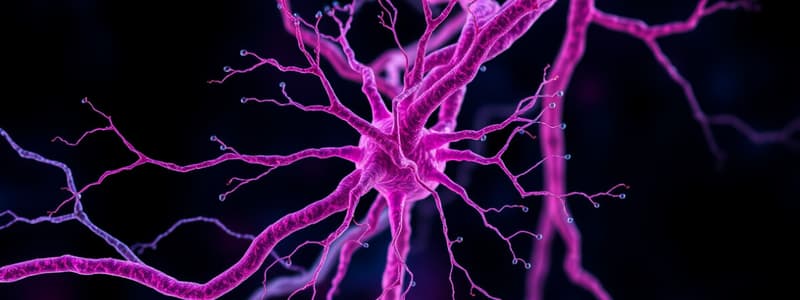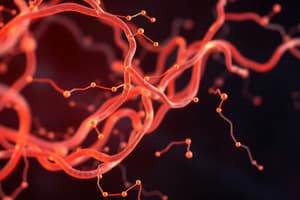Podcast
Questions and Answers
What is the main function of capping proteins like capZ in actin filaments?
What is the main function of capping proteins like capZ in actin filaments?
- To sever actin filaments into shorter lengths
- To crosslink actin filaments for stability
- To promote polymerization of actin filaments
- To prevent the addition of new actin monomers (correct)
Which accessory protein is responsible for severing actin filaments?
Which accessory protein is responsible for severing actin filaments?
- Filamin
- Gelsoline (correct)
- Thymosin
- Spectrin
What is the difference between G-actin and F-actin?
What is the difference between G-actin and F-actin?
- G-actin binds ATP while F-actin does not
- G-actin is less stable than F-actin
- G-actin is monomeric and F-actin is polymeric (correct)
- G-actin is filamentous while F-actin is globular
What property allows actin to act as a hydrolytic enzyme?
What property allows actin to act as a hydrolytic enzyme?
Which of the following proteins is specifically noted for anchoring the cytoskeleton to the plasma membrane?
Which of the following proteins is specifically noted for anchoring the cytoskeleton to the plasma membrane?
How do the plus and minus ends of an actin filament differ in terms of growth rates?
How do the plus and minus ends of an actin filament differ in terms of growth rates?
What type of secondary structures are found in the G-actin protein?
What type of secondary structures are found in the G-actin protein?
Which proteins are involved in promoting lateral interactions between actin filaments to form active bundles?
Which proteins are involved in promoting lateral interactions between actin filaments to form active bundles?
What is the primary function of the ATP binding site in actin?
What is the primary function of the ATP binding site in actin?
Which of the following statements about actin isoforms is correct?
Which of the following statements about actin isoforms is correct?
What is the significance of the high conservation of actin across species?
What is the significance of the high conservation of actin across species?
During the actin polymerization process, what is the stable form that predominates in cells?
During the actin polymerization process, what is the stable form that predominates in cells?
What does the term 'treadmilling' refer to in the context of actin filaments?
What does the term 'treadmilling' refer to in the context of actin filaments?
Which step is considered the limiting factor in the formation of actin filaments?
Which step is considered the limiting factor in the formation of actin filaments?
How many distinct isoforms of actin are present in vertebrates?
How many distinct isoforms of actin are present in vertebrates?
What role does actin play in cellular processes?
What role does actin play in cellular processes?
What is the critical concentration of actin monomers used for?
What is the critical concentration of actin monomers used for?
Which actin form is functional in the assembly of filaments?
Which actin form is functional in the assembly of filaments?
What is the primary function of treadmilling in actin filaments?
What is the primary function of treadmilling in actin filaments?
Which actin binding protein promotes the elongation of actin filaments?
Which actin binding protein promotes the elongation of actin filaments?
What effect does Cytochalasin B have on actin filaments?
What effect does Cytochalasin B have on actin filaments?
How does Latrunculin affect actin filaments?
How does Latrunculin affect actin filaments?
What function does the Arp2/3 complex serve in actin dynamics?
What function does the Arp2/3 complex serve in actin dynamics?
Which of the following statements about Taxol is true?
Which of the following statements about Taxol is true?
What role does Tropomyosin play in muscle cells?
What role does Tropomyosin play in muscle cells?
Which binding protein is responsible for capping the minus end of actin filaments?
Which binding protein is responsible for capping the minus end of actin filaments?
What is the effect of Gelsolin on actin filaments?
What is the effect of Gelsolin on actin filaments?
In the context of cytoskeletal dynamics, what does dynamic instability refer to?
In the context of cytoskeletal dynamics, what does dynamic instability refer to?
What role does cofilin play in actin filament dynamics?
What role does cofilin play in actin filament dynamics?
What is the effect of increased levels of inositol phospholipid PIP2 on actin filament dynamics?
What is the effect of increased levels of inositol phospholipid PIP2 on actin filament dynamics?
Which protein is primarily activated for rapid destabilization of actin filaments?
Which protein is primarily activated for rapid destabilization of actin filaments?
How do capping proteins influence actin dynamics?
How do capping proteins influence actin dynamics?
In muscle cells, what is the primary role of tropomyosin?
In muscle cells, what is the primary role of tropomyosin?
What is the primary role of profilin in actin filament dynamics?
What is the primary role of profilin in actin filament dynamics?
How do the structures and interactions of cross-linking proteins influence actin filament arrangement?
How do the structures and interactions of cross-linking proteins influence actin filament arrangement?
What triggers the activation of the Arp2/3 complex?
What triggers the activation of the Arp2/3 complex?
What type of actin filament arrangement does formin promote?
What type of actin filament arrangement does formin promote?
What is a primary characteristic of the branches formed by the Arp2/3 complex?
What is a primary characteristic of the branches formed by the Arp2/3 complex?
What happens to the Arp2/3 complex upon receiving a regulatory signal?
What happens to the Arp2/3 complex upon receiving a regulatory signal?
Why is profilin prevented from binding to the minus end of actin filaments?
Why is profilin prevented from binding to the minus end of actin filaments?
What role does Cdc42GTP play in the activation of actin nucleating factors?
What role does Cdc42GTP play in the activation of actin nucleating factors?
What effect does severing protein have on branched actin networks?
What effect does severing protein have on branched actin networks?
What is the result of signaling pathways that involve profilin regarding actin dynamics?
What is the result of signaling pathways that involve profilin regarding actin dynamics?
Flashcards are hidden until you start studying
Study Notes
Actin Protein Overview
- Actin is a globular protein with a molecular weight of approximately 40 kDa, composed of around 350 amino acids.
- Exists in two forms: globular (G-actin) and filamentous (F-actin).
- Critical for various cellular functions, including muscle contraction, cell motility, and cytokinesis.
- Features a cleft in its core that binds ATP, allowing it to hydrolyse ATP to ADP, playing a role as a hydrolytic enzyme.
Accessory Proteins and Their Functions
- Accessory proteins regulate actin dynamics, including:
- Monomeric Binding Proteins: Thymosin sequesters G-actin to prevent polymerization.
- Severing Proteins: Gelsolin severs filaments to promote depolymerization.
- Filament Anchoring Proteins: Spectrin and ERM proteins anchor the cytoskeleton to the plasma membrane.
- Crosslinking Proteins: Filamin and others facilitate the formation of filament bundles.
- Capping Proteins: CapZ stabilizes the plus end of actin filaments, while Tropomodulin caps the minus end.
- Filament Bundling Proteins: α-Actinin and fimbrin stabilize lateral interactions between actin filaments.
Actin Dynamics
- Treadmilling: The dynamic process of simultaneous addition and removal of actin monomers, maintaining a constant filament size.
- The plus end of an actin filament grows faster, while the minus end shrinks more rapidly due to monomer removal.
- The critical concentration governs the equilibrium stage of filament turnover; it can be calculated using the formula Cc = koff/kon.
Actin Interactions and Cellular Processes
- Actin interacts with various proteins involved in signaling, cell shape maintenance, and organelle movement.
- Vertebrates possess three isoforms of actin—α, β, and γ—critical for muscle contraction and non-muscle cellular functions.
- Extensive interactions with cellular membranes are essential for processes like cell adhesion and signaling.
Actin Binding Drugs and Their Effects
- Latrunculin: Sequesters G-actin, preventing its polymerization and leading to depolymerization.
- Phalloidin: Binds to filamentous actin, stabilizing filaments and preventing turnover; used in cytoskeleton analysis.
- Cytochalasin B: Caps the plus end of actin filaments to prevent assembly, promoting disassembly at the minus end.
- Taxol: Stabilizes microtubules, used as an anti-cancer drug that prevents cell division.
Profilin and Thymosin Interaction
- Profilin promotes the elongation of actin filaments by binding to actin monomers and shuttling them to the plus end, while thymosin sequesters them.
- The interaction dynamics between thymosin and profilin can modify filament growth rates in response to cellular signaling events.
Nucleating Factors and Filament Formation
- Formin: Facilitates the elongation of straight actin filaments from an initial nucleus.
- Arp2/3 Complex: Promotes the branching of actin filaments from preformed filaments upon activation by regulatory proteins like profilin and WASp.
- Activation of the Arp2/3 complex leads to nucleation on existing filaments, forming branched filament networks essential for cell locomotion.
Signal Transduction
- Actin dynamics are linked to signaling pathways; proteins like profilin respond to upstream signals to reorganize the cytoskeleton.
- The activation of signaling cascades, such as those initiated by growth factors, leads to growth and remodeling of the actin cytoskeleton at specific cellular sites.
Summary
- Actin, a highly conserved protein across species, plays integral roles in cell structure and function.
- The regulation of actin filament dynamics by accessory proteins influences a range of cellular processes, including movement and shape maintenance.
- Understanding actin biology is fundamental in developmental biology, cell physiology, and therapeutic approaches to diseases involving cytoskeletal dysregulation.### Actin Cytoskeleton Dynamics
- Actin cytoskeleton dynamics are influenced by signaling events in both quiescent and responsive states, promoting cell survival and growth factor responses.
- Actin structures include Arp2 and Arp3, which are structurally similar and exhibit polarity with plus and minus ends.
ATP Cap and Filament Stability
- Actin filaments have an ATP cap at the plus end; new subunits are added while bound to ATP before hydrolyzing to ADP, leading to destabilization.
- Formin continues to promote growth at the plus end despite ATP hydrolysis-induced destabilization.
Regulatory Proteins
- Cofilin and gelsolin are key regulatory proteins that respond to signals to promote filament destabilization.
- Cofilin activates under conditions requiring relatively slower destabilization; gelsolin is activated for rapid destabilization by severing filaments.
Capping Proteins
- Capping proteins stabilize actin filaments; their association with filament ends is influenced by localized intracellular signals.
- PIP2, an inositol phospholipid, regulates plus end capping proteins, promoting uncapping when increased, facilitating actin polymerization at the plasma membrane.
Severin Proteins and Muscle Cells
- Severin proteins facilitate filament destabilization; cofilin destabilizes while tropomyosin stabilizes.
- Tropomyosin is crucial in muscle cells, where it is abundant, and works alongside troponin to regulate muscle contraction.
Cofilin Mechanism
- Cofilin binds laterally to ATP-hydrolyzed (ADP-bound) actin filaments, twisting them and promoting further destabilization.
- Cofilin preferentially interacts with the minus end, reducing subunit interactions and enhancing disassembly.
Tropomyosin Isoforms
- Multiple isoforms of tropomyosin exist, contributing to the diversity of actin filament regulation and function.
Studying That Suits You
Use AI to generate personalized quizzes and flashcards to suit your learning preferences.




